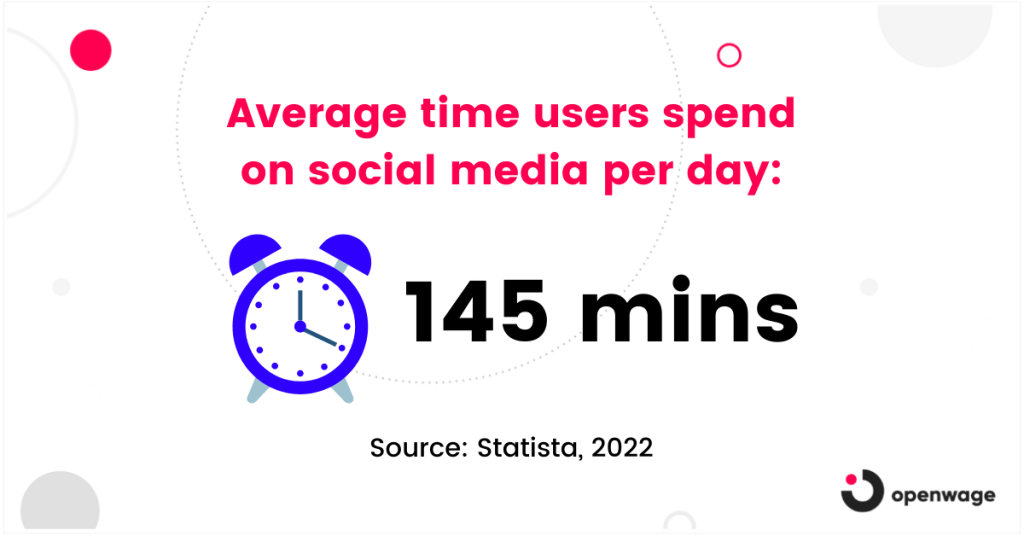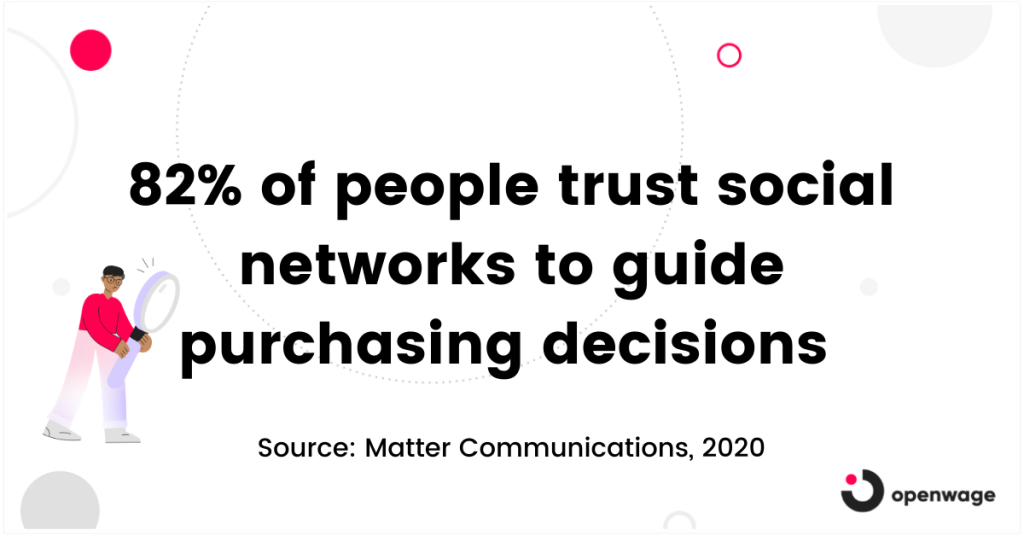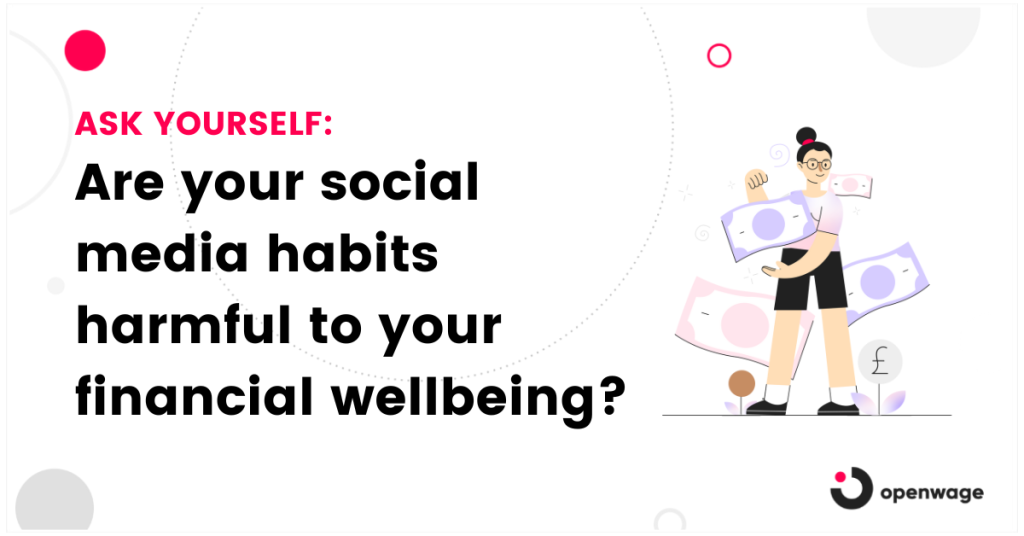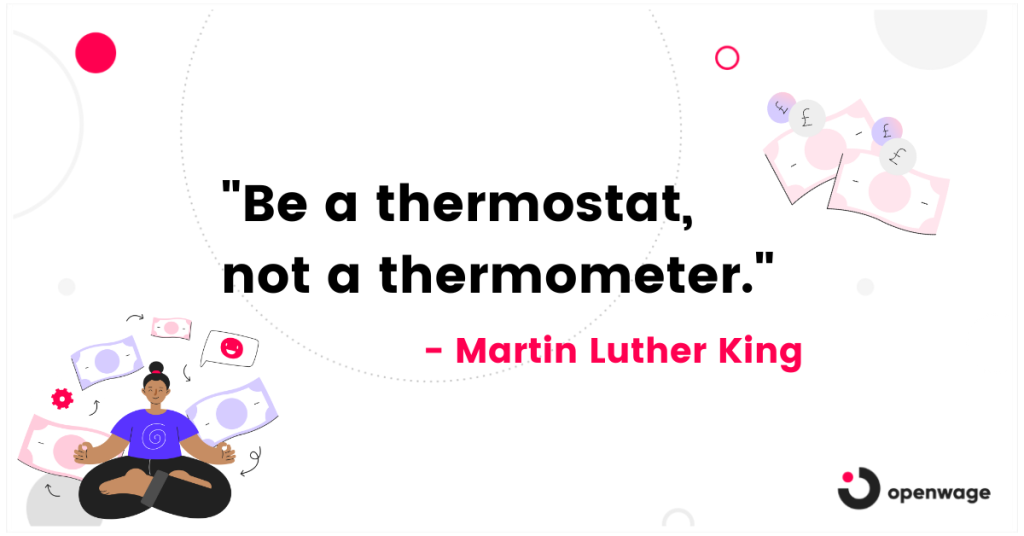
Social media and financial wellbeing: Know the warning signs
Daily use of social media is impacting our lives in more ways that we think. Discussions around the impact of social media on our mental health are plentiful. But much-less talked about is the impact of social media on our financial wellbeing.
The explosive rise of social media
As of January 2021, 53 million of us in the UK are active on social media with internet users spending a staggering 145 minutes per day on average on platforms including Facebook, Instagram and TikTok.
It’s been proven that social media negatively affects our mental health, with links to increased depression, anxiety, and loneliness. Now there’s good reason to believe that social media impacts our financial wellbeing as well.
Financial wellbeing and mental health issues are closely linked
Financial wellness means feeling calm, secure, and in control of our financial future. Social media on the other hand often leaves us feeling anxious or incomplete. Know anyone who feels better after a thirty minute scroll? Neither do we.
Social media drives us to compare ourselves with others
Social media increases anxiety in several ways. Fear of missing out (FOMO) is a common complaint that leaves many of us compulsively checking our phones.
But constantly comparing ourselves is extremely harmful. Commonly known as compare and despair, measuring our lives against those represented on social media can leave us feeling anxious and depressed.

Every curated, filtered, and carefully chosen image drives the message deeper; we don’t measure up. FOMO and compare and despair encourages a state that psychologists call survival mode.
In survival mode, we don’t think clearly. We make impulsive decisions, we lose patience with long-term planning, and we’re less likely to be open to creative solutions.
Anything that negatively impacts our general happiness can have a knock-on effect on our financial wellbeing and this can affect how we are at work too.
For millennials “more than any other generation, social media and the allure to spend beyond their means could have long-term negative effects on their finances if they’re not careful.”
Paul Kelash, Vice President of Consumer Insights for Allianz
How can social media affect our financial wellbeing?
Social media affects our spending habits and behaviours in more ways than one. This is no accident – it’s been designed this way.
In a 2020 survey in the US, a whopping 88% of people said they remained out of pocket because of their social media purchases. Let’s take a closer look at how social media affects our spending.
Social media drives impulse buying
According to recent research, social media has caused a 40% increase in unplanned purchases. Even more concerning is that 57% of millennials have parted with money they hadn’t planned on spending because of something they saw on social media.
Our culture of consumerism and the ease of online shopping isn’t conducive to our financial wellbeing. But we’re not entirely to blame.
Targeted ads encourage unplanned spending
Every time we go on social media, we’re bombarded by adverts that are targeted towards our age, gender, interests, and even location. Clever marketing campaigns make it hard not to be influenced by these adverts and you’re more likely to end up buying a product that you’ve seen advertised.

Many users report that targeted content is convenient and shows them products that are genuinely relevant to their interests. But it also increases the probability of making purchases we didn’t plan on making. They make us want more than we currently have.
Apps make it easier to part with your money
The rise of social media apps also pushes us to spend. While many apps are free to use, there are a lot you have to pay for. Getting the latest app can be hugely tempting, and the data speaks for itself.
Consumer spending on apps hit $135 billion in 2021 with consumers spending 130% more on health and fitness apps in 2019 than they did in 2017.
In-app purchases are extremely easy to make due to expertly-designed tactics from app makers. The costs can quickly mount up.
Social media influencers or just adverts?
Social media influencers are constantly sharing content about products to make us feel excited about them too. This is known as social proof and it’s a clever way to make us part with our money.
It’s so successful in fact that brands everywhere are partnering with social media influencers to increase their sales.
The influencer marketing industry is due to hit $13.8bn by 2022. There’s a good reason for this – influencer recommendations are often simply paid advertising.
Over half of women on social media made purchases due to influencer posts and 82% of people trust social networks to guide their purchasing decisions according to data compiled in this article by Digital Marketing Institute.
It’s clear that social media encourages us to spend money. It uses tried and tested psychological techniques that push us to make purchases to make ourselves feel better.
Social media tips to promote your financial wellbeing
Clever advertising, influential icons, and one-click purchasing aren’t conducive to promoting our financial wellbeing. So how do we reclaim our balance?
1. Remember, social feeds are highlights
Social media isn’t the real world. This may sound obvious, but the creators of these platforms acknowledge they were specifically designed to exploit a vulnerability in human psychology.

It’s all too easy to fall into the trap of comparing our lives with others and over-spending to keep up. It’s also easy to forget that most influencer profiles are essentially paid advertising platforms.
The marketing strategies and targeted ads used on social media are designed to trigger and heighten our natural human insecurities and fears with the aim of pushing us to consume.
2. Consider taking a break from social media
A social media break or detox is a powerful way of stepping back and getting some perspective. This can be a day, a week, or even a month.
Detoxers often report that the first few days are hard and withdrawal symptoms are common. The very fact that we experience withdrawal demonstrates the power of social media as an addiction.
Like any addiction, breaking free can be challenging, but it can also be very rewarding. Once we get past the initial panic, we can look forward to feeling more creative, more self-assured, and more productive with more time to focus on what really matters to us.
Moving away from the survival mode triggered by social media will encourage us to think about our long term goals, plans, and strategies that nurture all areas of our lives, including our finances.
By removing ourselves, even temporarily, from social media, we can make decisions and choices independently, away from the push and pull of marketing and advertising. Often, we aren’t even aware of how much we’re influenced by social media until we break free from it.
3. Focus on what you want
A short social media detox empowers us to redefine what we want more clearly. When (and if) we go back online, we can be more specific about the accounts and brands we want to follow and be super selective about what influences we allow into our lives.

It’s useful to ask yourself whether your social media activity is aligned with your goals. Identify your goals first, then go back online and set the tone for your feed, making sure it’s empowering.
For example, following fast food brands might not be helpful if you’re on a fitness drive. Equally, following fashion influencers could discourage you from saving.
What are your financial goals?
Re-evaluating how we engage with social media is essential when it comes to planning our long-term financial goals and our ability to be financially resilient.
The effects of social media on our spending can make it harder than ever to budget, with constant temptation and super-fast purchasing journeys.
Recognising your triggers is a great way to help combat the thought-patterns that can lead us to spend more.
Be a thermostat, not a thermometer
While a thermostat sets the temperature, a thermometer changes itself depending on its surroundings. Consider setting the tone for your social media engagement instead of letting social media set it for you. That way, you’re more likely to remain focused on your goals and feel more capable of achieving them.
About Openwage
Openwage is an on-demand pay provider that gives employees instant access to their earnings at any time before payday. On-demand pay is great for unexpected expenses and can help alleviate financial stress.
If you’d like the flexibility to decide when you get paid, your employer will need to be signed up to Openwage. You can tell us who your employer is and we’ll get in touch with them about offering on-demand pay to you and your colleagues.
The information in this article is for general information only. It does not constitute professional advice from Openwage. Openwage is not a financial adviser. You should consider seeking independent legal, financial, taxation or other advice to check how the information in this document relates to your unique circumstances.

